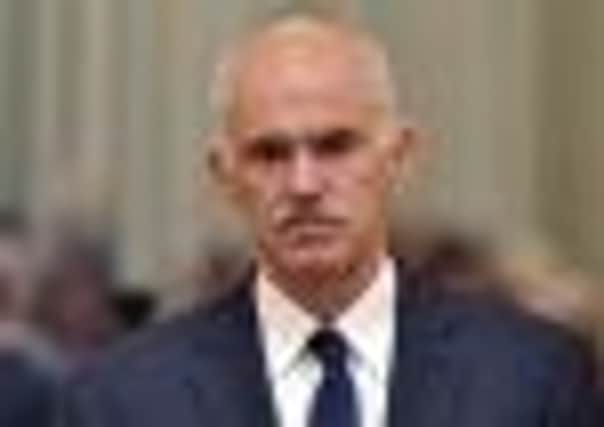Europe looks to China for bail-out backing


Klaus Regling arrived yesterday – a day after European leaders approved the plan. He said the European Financial Stability Facility (ESFS) will spend the next few months talking to governments and others about how the fund might be structured so the bonds it sells to raise money will be an attractive investment.
Contributing to Europe’s bail-out could help Beijing achieve its goal of taking a leading part in managing global finances, but a possible Chinese role in Europe – and suggestions that Beijing might want political concessions – has caused unease in the EU.
Advertisement
Hide AdAdvertisement
Hide AdLeaders of the 17 nations that use the euro agreed this week to expand the €440 billion (£386bn) bail-out fund in hopes of resolving the two-year crisis that threatens to push developed economies back into recession.
The increase would come from having the fund insure debt issued by countries such as Italy and Spain, preventing them from being dragged into the crisis.
European leaders also want to raise money from China, with £2 trillion in foreign reserves, and other global investors to increase the fund’s financial arsenal.
Mr Regling declined to say how much he hoped Beijing might contribute, but said China has a “particular need” for safe foreign assets to invest its multi-billion dollar monthly trade surpluses. He noted that his fund’s bonds, backed by the 17 euro-area governments, have the strongest AAA credit rating.
Chinese leaders have expressed sympathy and promised to support Europe, their biggest export market. But so far, have said only that they will help by continuing business as usual, buying Europe’s goods and stockpiling part of China’s trade surplus in the safest European government bonds.
Mr Regling said China and other Asian investors have bought 40 per cent of the bonds issued by the EFSF since it was created in May 2010, but he refused to say how much Beijing has purchased or give other details.
He said he would meet officials of China’s finance ministry and central bank. “It will be interesting to listen to them, like I listen to investors from many other parts of the world,” he said. The fund wants to find out how to structure investments “so that the money will actually come” from China and other investors, Mr Regling added.
A deputy Chinese finance minister said Beijing needs to learn how the new investment vehicle will work before deciding whether to invest.
Advertisement
Hide AdAdvertisement
Hide AdChina wants details on the amount of bonds issued by Italy and other individual European governments that might be guaranteed by the fund, Zhu Guangyao said at a separate briefing. “We must wait for the technicalities to emerge and then carry out serious study before we can decide on investment.”
Mr Regling said one issue to discuss is how to structure the special purpose vehicle to make it more attractive to China and other possible investors by having the EFSF absorb a bigger share of possible losses. He stressed that the meetings with the Chinese are not negotiations but “regular consultations at an early phase”.
Asked about suggestions Beijing might impose political conditions, Mr Regling said officials had not raised that issue with him.
Some European and Chinese commentators say Beijing might press Europe to refrain from human rights criticism or grant Beijing market-economy status, which would make it harder for Europe to pursue trade complaints against China.
“I have not been confronted with this,” Mr Regling said. “I am not talking on behalf of the European Union, so I am the wrong person” to discuss such issues.
He said he hoped to present the bail-out fund’s bonds as an attractive commercial investment to China once the details are worked out. “I am optimistic we will have a longer-term relationship,” he said.
Meanwhile, protests took place in Greece yesterday at austerity measures demanded by foreign lenders to tackle the debt crisis, shouting “traitors” at president Karolos Papoulias and other officials.
Demonstrators blocked a major national parade in Thessaloniki to commemorate Greek resistance in the Second World War, and in Athens marchers held black ribbons in anger at the higher taxes and wage cuts sought by the EU and the IMF in return for bail-out funds.
Advertisement
Hide AdAdvertisement
Hide Ad“The Greek people are now fighting a major battle. They also fought one many years ago today… We must unite to overcome this crisis,” Mr Papoulias said, adding that he had fought the Germans as a 15-year-old boy.
“So who is a traitor? They should be ashamed. I came to honour this historic city. There are some who want to prevent this celebration. I am very sorry,” he said.
The austerity measures demanded under an EU/IMF rescue of Greece have helped push its economy into its worst recession in four decades, driving unemployment to record levels above 16 per cent. Many Greeks accuse prime minister George Papandreou of sacrificing their wellbeing to foreign lenders.